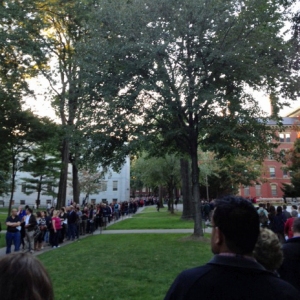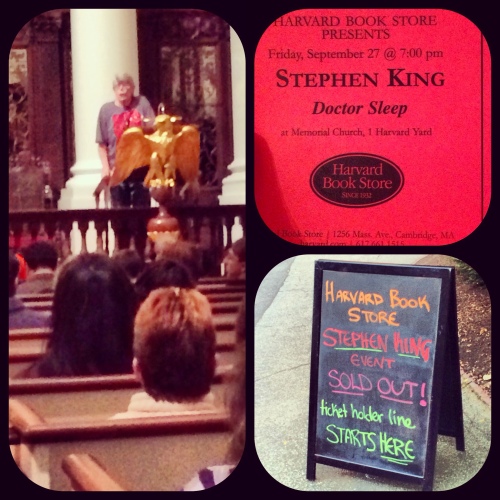A week ago today I was lucky enough to see Stephen King read, thanks to the fact that my boyfriend snapped up tickets for the two of us and his brother as soon as they went on sale. King’s appearance was part of a very limited promo tour for the release of Doctor Sleep, King’s new book, which is also a sequel to his beloved classic The Shining. One thousand tickets went on sale, and each included a copy of the book, of which 250 were signed by King and distributed randomly (two of them to us!). As you can imagine the event sold out very quickly.
I cannot explain how special the night was. My boyfriend has been a lifelong fan of King but has never seen him read solo, so that was really great. Moreover, the reading was held at Memorial Church at Harvard Yard, a beautiful and expansive white church with high ceilings that was also slightly eerie thanks to the dimmed lights, a candelabra and a poster-size setup of the book’s cover on the stage.
Any preconception that King might be the introverted/retiring-writer type was trounced immediately: He was funnier than most comedians (until he passed his hand over his face and, with a deep voice said, “Okay, now it’s time for me to be a serious writer type”), super sharp, and utterly charming. Even his sprinkling of “blue language” only served to further endear him to the audience. And best of all—if you live around these parts anyway—he came the podium making sure to point out the most important piece of his ensemble: a Red Sox 2013 AL East Champs shirt. (You know you’re at a Boston-area reading when, before the Q&A portion of the appearance, one of the event organizers makes sure to update everyone on the Sox score.)
In case you couldn’t be there, here are four (of the many) pieces of wisdom King imparted to us. (Note: Quotes are meant to give a feeling of immediacy, rather than indicate complete accuracy. Plus, in the spirit of the first bullet, King has looked over this post himself and approved of all content herewith.)
Master the art of the lie.
“For many years, I had a big black beard,” King told us. “Of course, now it would be pure white,” he said, pointing to his hair. But early in his career—he’d been at this writing thing about four years or so—he was sitting at the counter at the Original Nathan’s Famous on Coney Island, eating his meal, a book open in front of him as usual. Soon, he became aware that the cook was staring at him from his spot in the kitchen, his brow wrinkled. After a bit, the cook ambled over to King and said, “Hey aren’t you…,” King pauses here and affects a hokey voice, “someone?”
I’m getting recognized, King thinks, and with that his pride puffs and his posture straightens. “‘Why, yes, I am,'” he tells the cook.
“I mean like someone…famous?” the cook says. He studies King and then recognition hits. The cook snaps his fingers. “I got it—you’re Francis Ford Coppola.”
King pauses here, and looks around at the audience, a sly smile playing on his lips. “Why, yes,” he says, his voice deepening, “Why yes, I am.”
“Writers,” he said, “we’re all liars. Don’t believe anything we say.” He paused. “Except that story—that was true.”
Use your neuroses and fears to make money—not give it away.
 Much of King’s work has prompted speculation as to its creator’s emotional well-being. So it wasn’t surprising that one of the questions he cleared up prior to the Q&A portion of the evening—his “front-loaded” questions and answers—was “What happened to you to mess you up so badly that you can write about the things you do?” His answer, “Well, nothing.” Actually, he said, “I was a normal kid. Now I’m probably the most well-adjusted guy in this room.” As the audience erupted in laughter at the latter statement, he jerked his head toward some guy to his left in one of the front pews, “Nah, that guy thinks he’s the most well-adjusted person in the room,” he said.
Much of King’s work has prompted speculation as to its creator’s emotional well-being. So it wasn’t surprising that one of the questions he cleared up prior to the Q&A portion of the evening—his “front-loaded” questions and answers—was “What happened to you to mess you up so badly that you can write about the things you do?” His answer, “Well, nothing.” Actually, he said, “I was a normal kid. Now I’m probably the most well-adjusted guy in this room.” As the audience erupted in laughter at the latter statement, he jerked his head toward some guy to his left in one of the front pews, “Nah, that guy thinks he’s the most well-adjusted person in the room,” he said.
“But seriously….” King told us that getting all that dark matter onto the page is cathartic. In contrast to all those people who pay so much money to therapists, King says he’s found no need for such a service: He funnels all his “material,” the inner turmoil and so on that a person might bring to said therapist, to the page.
A second part to that inquiry, King told us, tends to center around whether he gives himself nightmares with what he writes. With rare exceptions (one would be The Shining‘s Mrs. Massey in 217), King’s sleep tends to be not only nightmare-free, but virtually dream-free altogether. “I hardly dream,” he said. “Writing is dreaming.”
Cherish your lack of celebrity.
 King told us he’s often asked what it’s like to be famous. “Well, it’s weird,” he said. “Boston’s not soooo bad,” he said. “In the Boston area people mostly leave me alone.” As illustration, King transforms into a Boston guy passing the writer by on the street. King jerks his chin up once in a guy greeting, “Hey Steve, how ’bout those f%#kin’ Red Sox,” then continues on his way.
King told us he’s often asked what it’s like to be famous. “Well, it’s weird,” he said. “Boston’s not soooo bad,” he said. “In the Boston area people mostly leave me alone.” As illustration, King transforms into a Boston guy passing the writer by on the street. King jerks his chin up once in a guy greeting, “Hey Steve, how ’bout those f%#kin’ Red Sox,” then continues on his way.
Still, King said that even in Boston, where the attention to fame is low-key, being a celebrity author can be strange. One of the reasons: “Being a writer is like being a secret agent,” King said. “We should be watching you, not the other way around.”
Combat writer’s block with exercise.
During the Q&A section, King was asked if he ever gets writer’s block. Perhaps surprisingly, coming from one of modern literature’s most prolific authors, King has occasionally struggled with this condition. But, he told us, “You usually see the wall coming ahead of time.” As illustration, King gave us some background on his writing style. He relayed that he was horrified when his friend John Irving told him that he writes the last sentence early on so he knows the direction he’s heading with the novel he’s writing. In contrast, King said that he himself is a “fairly intuitive writer,” feeling his way along the thread that guides him along the story’s journey. Sometimes it’s easy to find that thread. Sometimes—not so much.
In the first category: “Annie Wilkes of Misery just came forward,” King said. “I was at a writing conference, when a woman came up to me, hugged me close, and whispered into my ear”—here King affects syrupy midwestern lady voice—”‘Oh, I wish I could just take you home,’ she said. ‘I have a story I want you to write.'”
 But sometimes things aren’t so easy. “Following the thread,” said King, “sometimes it’s hard to see; sometimes it breaks.” Such was the case when he was writing The Stand. He said that his plan was to start by focusing on one character in one chapter, then for the next chapter add another character, who he would then focus on, and so on until the story expanded to about 30 characters. Then the process would reverse, as The Stand‘s characters would be eliminated. Only it didn’t work out that way.
But sometimes things aren’t so easy. “Following the thread,” said King, “sometimes it’s hard to see; sometimes it breaks.” Such was the case when he was writing The Stand. He said that his plan was to start by focusing on one character in one chapter, then for the next chapter add another character, who he would then focus on, and so on until the story expanded to about 30 characters. Then the process would reverse, as The Stand‘s characters would be eliminated. Only it didn’t work out that way.
“I had all these characters, and I didn’t know what to do about it them,” he said. They were having political meetings and nobody would want to read that,” he said. “I thought to myself, ‘This is boring as sh#t.'”
Luckily, he had an epiphany. He was taking one of his walks (which he talks about in On Writing, and he had an epiphany. “A bomb! It will kill lots of characters off,” he said. Which didn’t make everyone happy, of course, he told us, but that’s a different story….and lesson.



This is so cool! I’m so jealous, but I’m glad you got to have such a wonderful experience. I would love to see King speak someday. And I’m really glad he talked about not all horror writers being “messed up” somehow. I hate that stereotype. Great blog post. Thanks for sharing!
Thank you, and I saw your tweet about your husband’s reaction to your latest story and thought of that connection!
I really enjoyed this post. This is my first time to your site, and I was persuaded to visit because I saw the title and had just – two weeks ago – written a very similar post. I am not a huge fan of King’s, I have thoroughly enjoyed some books and put down others with a yawn, but I read On Writing and was amazed at not only how common sense his advice was, but also how I was already employing it.
I don’t want to spam your blog with my post, but if you’d care to read it, follow the link. The post asks “If you were going to write a how to writing book what would the first sentence be?”
http://damiengaleone.com/blog/?p=1649
Thanks, and you’re spot on: “Just do it,” just about sums it up.
Fabulous post, Diann. Like Annie, I’m jealous, but also SO grateful you provided this lovely accounting of your experience! I loved this most about what you shared: “Being a writer is like being a secret agent,” King said. “We should be watching you, not the other way around.”
Thank you, Melissa. I loved that line too. Also, writing is like dreaming…love the image of arising early morning, half asleep and writing before the Editor kicks in. I think there may be a part 2 since I couldn’t cover everything that struck me in a quick post!
It sounds like you had a wonderful experience and really got a lot from the event! Thanks for the excellent write-up 🙂
Thank you, Justice, and btw, loved The Snow Child too!
I’ve never been a fan of his books simply because I’m not a fan of being scared. But he’s a writer I really admire as an amazing storyteller. I also used to love his column in EW. Really great anecdotes and advice for writers. Thanks for sharing this!
Thanks, Karla. I loved that EW column too. I’d never read him before I met my boyfriend for the same reason, but I love his storytelling as well, especially when it’s showcased in something non-scary like The Body (aka Stand By Me).
Rita Hayworth and Shawshank Redemption also comes to mind. Love that story.
: ) I almost wrote that one as well! I had actually just re-read those two a couple weeks ago so they were on my mind.
This was such a great “report.” I appreciate all the details as King totally fascinates me. (Though I don’t read much of his stuff, I totally respect his originality! And I loved his book on writing.)
Pingback: Over Description | A. R. Urena